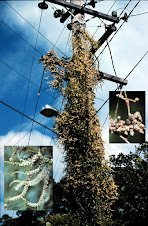Impacts of environmental weeds include:
• crowding out local native plants by competing for water, nutrients and
light
• preventing establishment of native plant seedlings by creating heavy
shade or a thick layer of plant litter on the ground
• changing the nutrient content of soils, possibly making the soil more
hospitable for weeds
• changing the fire regime by making vegetation more or less flammable,
dictating what native plants will continue to survive in the changed conditions
• altering the availability of food and shelter for native animals, and
improving conditions for introduced species or opportunist natives such as Pied
Currawongs and Noisy Miners.
Even
well-behaved garden plants can have unforeseen impacts on native animals. Many
gardeners like to include nectar-producing plants “for the birds”. The
provision of an abundant and constant food supply can help large, aggressive
birds to increase, often at the expense of other species. For example, Noisy
Miners, Bell Miners and Wattlebirds will drive out smaller honeyeaters, and
Rainbow Lorikeets take over tree hollows needed for nesting by other birds, possums
and bats.
You can download the Grow Me Instead guide for the NSW south coast region here.
You can download the Grow Me Instead guide for the NSW south coast region here.
Black-eyed Susan, Thunbergia alata
























No comments:
Post a Comment